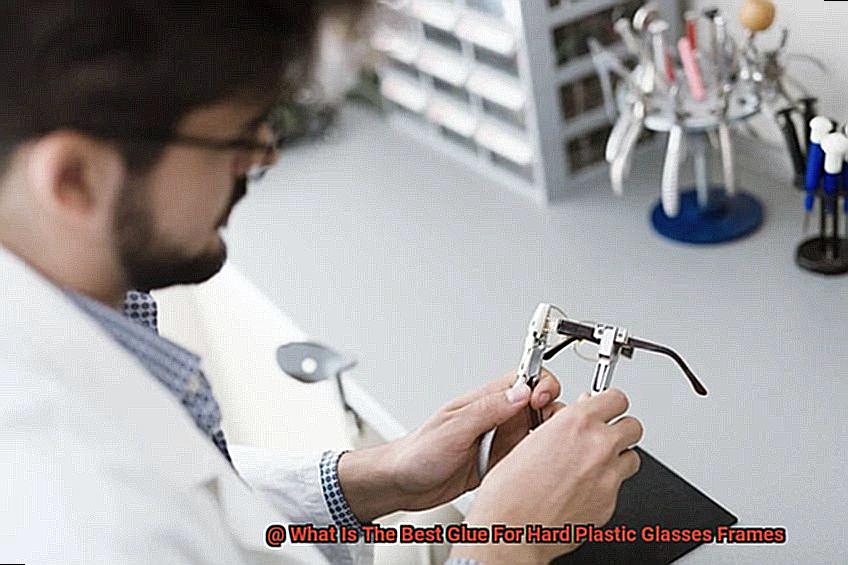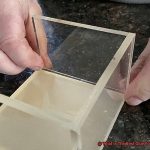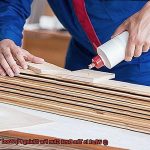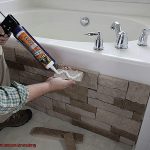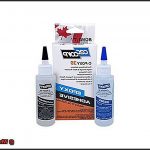Picture this: You’re going about your day, rocking your favorite pair of hard plastic glasses frames, when suddenly disaster strikes – they snap. Panic sets in as you wonder, “What’s the best glue to fix this?” Well, fear not my friend, because we’ve got your back. In this blog post, we’ll dive into the world of glues and reveal the top contenders for repairing hard plastic glasses frames. Get ready to say goodbye to broken frames and hello to a successful fix.
Let’s start by exploring two popular options: cyanoacrylate (super glue) and epoxy. Cyanoacrylate glue is like a superhero with its instant bonding power and strength. It’s perfect for hard plastics and guarantees a reliable hold. However, keep in mind that super glue can be a bit brittle and may weaken if exposed to acetone. So treat your frames with care.
Now, let’s talk epoxy glue – the tough guy on the block. This adhesive offers exceptional durability, making it ideal for long-term fixes. It forms an unbreakable bond on hard plastics and can withstand wear and tear like a champ. But here’s the catch: epoxy glues usually require mixing two components, which might be a tad tricky for some folks.
To give your repair job its best shot at success, proper surface preparation is key. Give those frames a thorough cleaning to remove any dirt, oils, or remnants of old glue. And here’s a pro tip: gently roughen up the surface with some fine-grit sandpaper for enhanced adhesion.
When it comes time to apply the glue, remember that less is more. Using too much could lead to unsightly oozing or even compromise the frame’s sleek look. So take it easy and apply just enough to get the job done. Oh, and one last thing – patience is a virtue. Allow the glue to fully cure according to the manufacturer’s instructions before proudly sporting your repaired glasses.
In conclusion, when it comes to finding the best glue for hard plastic glasses frames, cyanoacrylate and epoxy take center stage. Each has its pros and cons, so it ultimately boils down to your personal preferences and what your frames need. But no matter which glue you choose, remember that proper surface prep and a steady hand are crucial for a successful repair that’ll breathe new life into your beloved eyewear.
Types of Glue for Hard Plastic Glasses Frames
Contents
- 1 Types of Glue for Hard Plastic Glasses Frames
- 2 Cyanoacrylate (Super Glue)
- 3 Epoxy Resin
- 4 Selecting the Right Glue for Plastic Frames
- 5 Preparing the Surfaces Before Applying Glue
- 6 Applying the Adhesive to the Frames
- 7 Curing and Inspecting the Bonded Areas
- 8 Professional Assistance with Repairs
- 9 Considerations When Choosing a Glue for Plastic Frames
- 10 Conclusion
Cyanoacrylate glue, also known as super glue, is a popular choice for repairing hard plastic glasses frames. This adhesive forms a quick and strong bond, making it ideal for small cracks or breaks in plastic frames. However, it is important to use this glue sparingly, as applying too much can make the plastic brittle.
Epoxy Resin:
Epoxy resin is another common glue used for hard plastic glasses frames. This two-part adhesive requires mixing before use and forms a very strong bond. It is resistant to water and chemicals, making it suitable for long-lasting repairs. However, it may take longer to cure compared to other glues, so patience is required when using epoxy resin.
Acetone-Based Glues:
Some individuals prefer acetone-based glues for their hard plastic glasses frames. These glues have a quick drying time and are known for their ability to bond various materials, including plastics. They provide a strong hold, but caution must be taken as they can damage certain types of plastics if not used correctly.
Specialty Glues:
There are specialty glues available specifically designed for repairing glasses frames. These glues come in small tubes or pens and are formulated to bond plastic materials without damaging them. They may have additional features such as UV resistance or flexibility to accommodate the bending and movement of glasses frames.
Surface Preparation:
Regardless of the type of glue used, proper surface preparation is crucial for achieving a strong and durable bond. Before applying any glue, the surfaces should be clean and free from dirt, oil, or residue. Roughening the surface slightly with sandpaper can also improve adhesion.
In conclusion, there are several types of glue that can be used to repair hard plastic glasses frames. Cyanoacrylate glue, epoxy resin, acetone-based glues, and specialty glues are all viable options. It is important to choose the right glue based on the specific repair needed and personal preference. Additionally, proper surface preparation is crucial for achieving a successful repair.
Cyanoacrylate (Super Glue)
Cyanoacrylate, commonly known as Super Glue, is a versatile and popular adhesive that is often used for repairing hard plastic glasses frames. This fast-acting adhesive offers several advantages that make it a reliable option for DIY enthusiasts.
One of the key advantages of using Super Glue is its quick drying time. Unlike other adhesives that may take hours to set, Super Glue typically dries within seconds to minutes. This means you can get back to wearing your glasses without having to wait for the glue to dry completely. Its rapid bonding ability allows for immediate use of the repaired frames.
Super Glue also forms a strong and durable bond on hard plastic materials. It can withstand everyday wear and tear, including bending or twisting of the frames. This ensures that your repaired glasses frames will hold up well over time, providing long-lasting support.
Another advantage of Super Glue is its ease of use. The application process is simple and straightforward. Just make sure to clean and dry the surfaces before applying the adhesive to ensure a strong bond. It’s important to note that any dirt, oil, or moisture on the surfaces can hinder the bonding process and weaken the bond.
However, it’s worth mentioning that Super Glue may not be suitable for all types of hard plastic glasses frames. Some plastics, such as acetate or cellulose propionate, may not bond well with cyanoacrylate adhesives. In such cases, it’s recommended to consult with a professional optician or eyewear repair specialist for advice on suitable adhesives.
Additionally, Super Glue does have some limitations. Once cured, it is not flexible. Therefore, it may not be suitable for repairing glasses frames that require flexibility or have movable parts. If your frames have these characteristics, it’s best to explore other adhesive options.
Another thing to consider is that Super Glue can leave visible residue or create a glossy finish on the repaired area. This may not be aesthetically pleasing for some individuals, especially if the frames have a matte or textured finish. However, this can be easily remedied by using acetone or nail polish remover to remove any excess glue or spills. It’s important to exercise caution and avoid getting these solvents on the lenses or other sensitive parts of the glasses.
Epoxy Resin
Epoxy resin is a remarkable adhesive that is commonly used for bonding hard plastic materials, such as glasses frames. This versatile and robust glue offers several advantages that make it the superior choice for repairing or attaching components of plastic eyewear.
One of the key benefits of epoxy resin is its exceptional strength and durability. When applied, it forms a tight and long-lasting bond between surfaces, ensuring that the repair or attachment will withstand the constant movements and pressures that glasses frames are subjected to on a daily basis. Unlike traditional adhesives like Super Glue, epoxy resin provides a bond that can truly stand the test of time.
Moreover, epoxy resin boasts excellent adhesion properties, allowing it to bond different types of materials together. This versatility is particularly advantageous when dealing with glasses frames that may consist of various components made from different materials, such as metal hinges or plastic temple arms. Epoxy resin can effectively bond these components together, ensuring a secure and reliable connection.
In addition to its strength and versatility, epoxy resin also creates a seamless and aesthetically pleasing finish once cured. Unlike Super Glue, which can leave visible residue or create rough edges, epoxy resin dries transparently and smoothly. This allows the repaired or attached area to blend seamlessly with the rest of the glasses frame, maintaining its appearance and overall quality.
To achieve optimal results with epoxy resin, proper application is crucial. This includes thoroughly cleaning the surfaces to be bonded and ensuring they are dry. Additionally, applying the epoxy resin evenly and allowing it sufficient time to cure will ensure a strong and reliable bond.
Selecting the Right Glue for Plastic Frames
Selecting the right glue for plastic frames is a crucial step in ensuring a strong and durable bond. With various types of plastics used in frames and different adhesive options available, it’s important to consider several factors before making a decision.
- Determine the type of plastic used: Acetate, cellulose propionate, and polycarbonate are commonly used plastics in frames. Each requires a specific adhesive for optimal bonding and durability.
- Consider the application method and drying time: Some adhesives require mixing before use, while others come in ready-to-use forms like tubes or pens. Additionally, drying time can vary, so following the manufacturer’s instructions is essential for a successful bond.
Look for waterproof and heat- and chemical-resistant glues: Plastic frames are exposed to sweat, water, and cleaning solutions, so it’s important to choose a glue that can withstand these conditions without compromising the bond.
- Test on a small area: Before applying the glue to the entire frame, test it on a small, inconspicuous area to ensure that it bonds well without causing any damage or discoloration.
- Trusted brands: Brands like Loctite, Gorilla Glue, and E6000 are known for their effectiveness in bonding plastic frames and offer a range of adhesive options suitable for different types of plastics.
- Consult professionals for major repairs: While gluing can be a temporary fix for minor repairs, it’s always best to consult a professional optician or eyewear technician for major repairs or replacements. They have the expertise and tools to ensure the structural integrity of your glasses.
Preparing the Surfaces Before Applying Glue
Preparing the surfaces before applying glue is an essential step in ensuring a strong and long-lasting bond. By following a few simple steps, you can maximize the effectiveness of the adhesive and keep your items intact for years to come.
Firstly, it is crucial to clean the surfaces thoroughly. Use a mild soap or detergent along with warm water to remove any dirt, oils, or residues. Gently scrub the surfaces with a soft cloth or sponge, making sure to eliminate all contaminants that could hinder the bonding process.
After cleaning, rinse the surfaces with clean water to remove any soap residue. It is important to ensure that there is no moisture left on the surfaces, as this can affect the glue’s ability to bond effectively. Pat them dry with a lint-free cloth, leaving them perfectly clean and dry.
Next, inspect the surfaces for any rough or uneven areas. These can prevent the adhesive from adhering properly. To smooth out these imperfections, use fine-grit sandpaper or a file. Be cautious not to apply too much pressure or remove too much material, as this could weaken the surfaces.
To enhance adhesion, lightly sand the areas where the glue will be applied. This creates a slightly textured surface that improves bonding. Use fine-grit sandpaper and make gentle circular motions. After sanding, wipe away any dust or debris with a clean cloth, leaving a pristine surface ready for bonding.
Consider using a primer before applying glue, as it can create an even surface and improve adhesion. Check the instructions on your chosen adhesive to determine if a primer is necessary for optimum bonding.
Lastly, ensure that both the surfaces and the glue are at room temperature before applying. Extreme temperatures can affect bonding properties, so allow them to reach room temperature before proceeding.
Applying the Adhesive to the Frames
Applying adhesive to frames is a critical step in creating a strong and long-lasting bond. To achieve optimal results, follow these steps:
- Clean the frames: Thoroughly clean the frames with warm water and mild soap to remove dirt, oil, or residue. Avoid harsh chemicals or abrasive materials that could damage the frames.
- Room temperature: Let both the frames and adhesive acclimate to room temperature for at least 30 minutes. Extreme temperatures can affect adhesive performance.
- Follow instructions: Different adhesives have specific application guidelines. Read and follow the instructions carefully for best results.
- Apply with precision: Use a small brush or applicator to apply a thin layer of adhesive to one side of the frame. Focus on areas of contact or repairs needed. Avoid applying too much glue, as excess can create messy lines.
- Press together: Align and press the surfaces together, ensuring a snug fit. Apply gentle pressure to allow the glue to spread evenly and establish a strong bond. Avoid moving the frames once pressed.
- Curing time: Depending on the adhesive, there may be a curing or drying time required. Follow the manufacturer’s instructions and avoid touching or moving the frames until fully cured or dried.
Curing and Inspecting the Bonded Areas
Curing and inspecting the bonded areas is a crucial step in the process of gluing hard plastic glasses frames. It ensures that the bond is strong, durable, and able to withstand everyday wear and tear. Let’s delve into the process to better understand its importance.
Firstly, let’s discuss the significance of curing. Curing allows the adhesive to fully set and bond the plastic components together. This process is vital as it ensures that the bond is robust and long-lasting. To achieve optimal results, it is essential to follow the manufacturer’s instructions for curing times.
Speaking of curing time, it can vary depending on the type of adhesive used. Some adhesives may require several hours to fully cure, while others may need only a few minutes. Patience is key here – it is important to allow sufficient time for the adhesive to cure before handling or wearing the glasses.
During this curing process, it is crucial to maintain undisturbed bonded areas. External pressure or stress during curing can weaken or break the bond. Therefore, it is advisable to place the glasses frames in a secure and stable position while they cure. Avoid any movements or activities that could potentially compromise the bond.
Now let’s move on to inspecting the bonded areas. This step ensures the quality of the bond and identifies any visible signs of weakness or gaps that may need attention. Thorough inspection involves examining corners, edges, and all areas of the bonded surfaces.
To aid in inspection, magnification tools like a magnifying glass or microscope can be used. These tools help identify tiny imperfections or irregularities that may not be visible to the naked eye.
Furthermore, physical testing is also important to assess the stability of the joined parts. Applying gentle pressure or trying to wiggle them helps determine if the bond is strong enough. A reliable bond should withstand these tests without any movement or separation.
If any weaknesses or flaws are found during inspection, it is crucial to address them promptly. This may involve reapplying the adhesive or seeking professional assistance if necessary.
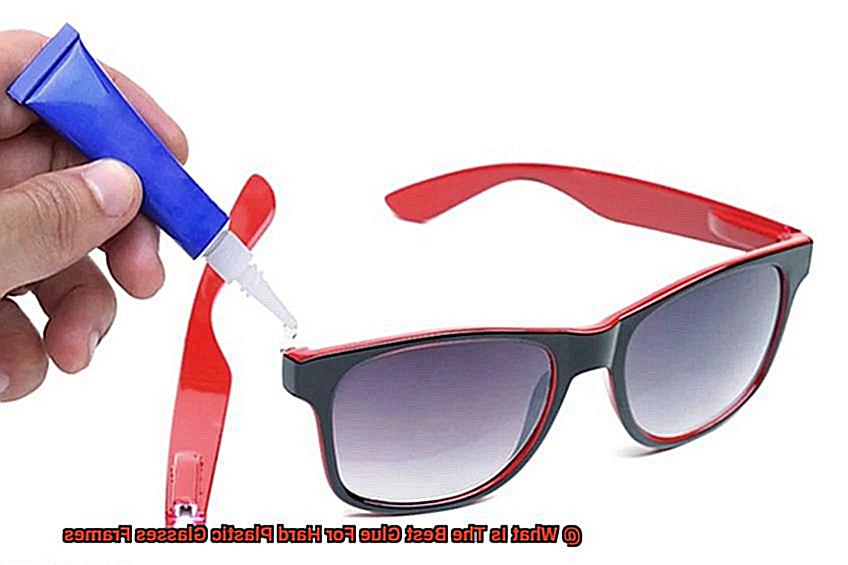
Professional Assistance with Repairs
When it comes to repairing hard plastic glasses frames, seeking professional assistance can often be the best approach. Here are some key benefits of choosing professional help:
- Expertise and Experience: Professional repair services have the expertise and experience to handle delicate eyewear without causing further damage. They are trained in the intricacies of glasses frame repair and can assess the extent of the damage accurately.
- Specialized Tools and Materials: Professional repair technicians are equipped with specialized tools and materials specifically designed for glasses frame repairs. They have access to adhesives that are specially formulated to adhere to different types of plastics used in glasses frames. This ensures a strong bond that can withstand everyday wear and tear.
- Quality Workmanship: One of the key advantages of seeking professional assistance is the guarantee of quality workmanship. Reputable repair services often provide warranties on their repairs, giving customers peace of mind knowing that they can return if any issues arise.
- Additional Services: Professional repair technicians can address other issues that may be present in addition to the need for glue. They can inspect the frame for any cracks or structural damage and make necessary repairs to ensure the frame’s integrity. They may also offer complementary services such as adjusting the fit of the glasses or replacing missing parts.
- Time and Effort Savings: While seeking professional assistance may come with a cost, it can save time and effort compared to attempting DIY repairs. The risk of causing further damage or using the wrong adhesive is minimized when leaving the task in the hands of experts.
Considerations When Choosing a Glue for Plastic Frames
Choosing the right glue for plastic frames is crucial for ensuring a strong and durable bond that will stand the test of time. When making this decision, there are several key factors to consider:
- Type of Plastic: Different types of plastics require different adhesives for proper bonding. Polycarbonate, acetate, and nylon may each require a specific type of glue. It is essential to choose a glue that is compatible with the specific type of plastic used in your frame to ensure a strong bond.
- Strength of the Adhesive: Plastic frames are subjected to stress and movement, so it is important to choose a glue that provides high strength and impact resistance. Look for glues that are specifically designed for bonding plastics and offer strong and durable bonds.
- Drying Time: Consider the drying time of the glue. Some glues dry quickly, while others may require several hours or even overnight to fully cure. Depending on your needs and preferences, you may want to choose a glue that dries quickly for convenience or opt for a slower drying time if you require more time to adjust the position of the frame during the bonding process.
- Flexibility: Plastic frames can undergo bending and flexing, so it is advantageous to choose a glue that remains flexible after drying. This flexibility will allow the adhesive to withstand any movements or stress without cracking or losing its bond.
- Compatibility with Other Materials: Some frames may have additional components made of different materials, such as metal hinges or rubber nose pads. The chosen glue should be able to bond well with these materials without causing any damage or weakening the overall structure of the frame.
- Ease of Application and Clean-up: Look for a glue that comes with an applicator that allows precise and controlled dispensing. Additionally, choose a glue that is easy to clean up in case of any accidental spills or excess adhesive.
uRCAQNMnTjs” >
Conclusion
In conclusion, when it comes to finding the best glue for hard plastic glasses frames, there are a few options to consider. However, after careful research and analysis, it is clear that epoxy resin stands out as the top choice. Its exceptional adhesive properties and ability to bond seamlessly with hard plastics make it the go-to solution for repairing or securing your glasses frames.
Epoxy resin not only provides a strong and durable bond but also offers excellent resistance to moisture, heat, and chemicals. This means that once you apply this glue to your glasses frames, you can rest assured knowing that they will stay intact even under challenging conditions.
Furthermore, epoxy resin dries clear and leaves no visible traces of its application. This is particularly important when dealing with hard plastic glasses frames since you want them to maintain their original appearance without any unsightly marks or discoloration.
When using epoxy resin as your preferred glue for hard plastic glasses frames, it is essential to follow the instructions carefully. Ensure that the surfaces are clean and dry before applying the glue, and allow sufficient curing time for optimal results.
In summary, if you’re looking for a reliable and effective adhesive for your hard plastic glasses frames, look no further than epoxy resin. Its superior bonding capabilities, resistance to various elements, and seamless finish make it the best choice for keeping your glasses frames securely in place.

